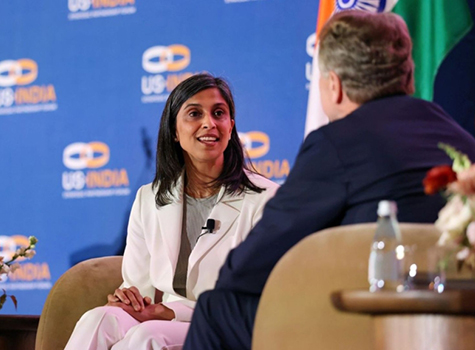By Samir Shukla
Gather around folks. Let’s play everyone’s favorite game: Bash the Media. The “media” has become a favorite punching bag for politicians, especially our commander-in-chief. Media bashing will likely ensue in one manner or another if a political discussion occurs. When I ask someone to define media, the answer is always incomplete. Some will say the “mainstream” media. Others will point to the 24-hour news channels. Bloggers. Websites. Radio talk shows. Magazines. Your neighborhood’s news and events flyer stuffed into your mailbox. Facebook. Yes, these are all media. There are many more.
The definition of the term media in the 21st century is malleable. Traditional newspapers have pared down. The three TV networks from that ancient era years ago are now competing with 100, 200, 300 or more channels beamed to us via satellite. Social media is already appropriately named. There are bloggers out there who have more readers than some small daily newspapers. Contemporary media can range from major news organizations to bloggers, and everything in between that disseminates information of some sort. Add to that politically-tinged or activist TV commercials and you have a trove of info and misinformation clogging the brain.
In this era of data mining, taste mining and opinion mining, even clicking on cat videos or celebrities’ “oops” moments create viral “news” items, where the internet aggregators are more than happy to feed you more of the same slop, mimicking your clicks. Every bloke with a computer or smartphone has become a part of the media. This level of participation is good, but it also creates a tribal environment, and instant knee-jerk reactions. People with similar beliefs tend to crouch together in dark corners and pat each other on the back. Conversations become unending attacks, communities and friends devolve into partisan nonsense. The truth gets hazy while opinionating runs rampant.
Politicians are the quintessential seekers of media and at the same time blamers of it. Our current president loves to bash the “dishonest” media anytime a question or critique is thrown at him, though he fully understands its value in getting him elected. I get the feeling some who voted for him are tiring of his all-purpose media bashing.
The problem with spinning alternative facts and blaming the fourth estate is that it has a way of coming back to haunt you. It’s better to be straight with your constituency or stockholders or potential voters than try to weasel them. People are not stupid. They are partisan, but not stupid. Transparency is the equalizing elixir. We live in a world where everyone is walking around with a multimedia device that can broadcast events happening at the precise moment. Blaming the media is not a good place to hide. Make your case, stand by your principles, negotiate deals with policymakers or stockholders, and let the results unfold. This holds for politicians as well as CEOs.
When someone continually blames or bashes the “media” you realize that person is doing so because he or she cannot make a case for themselves. They deflect tough questions by blaming this ghost enemy. If one is able to make concise, studied, fact-researched arguments, backed by what has worked in the past and what has not, then blaming of media or scapegoating perceived enemies becomes unnecessary. Again, people are not stupid. They catch on to B.S. fairly quickly.
When politicians bash the media rather than put forth ideas, ask tough questions, and hold them up to give detailed answers. Bashing something is not an answer. It is a cop out. This is not to say news organizations don’t make mistakes. Their op-ed pages are filled with partisans making their case. There are also myriad hyper-partisan websites, blogs and publications out there. They will spin their own tales that fit their own agenda. Fake or sarcastic news is so swiftly passed around via social media, that it increases the need for independent news organizations and non-partisan media to help unshackle the facts. Without some of these gatekeepers the miscreants will run amok, lies will rule the land, and politicians will feel emboldened to continue to pull the wool over people’s eyes. It’s your tax money being used. You should ask hard questions.
Here at Saathee we strive to bring correct and factual information to our readers. Do we make mistakes? Yes, it happens. But we own up to any mistakes and rectify the record. We don’t hide behind ideology and welcome discussion.
Yes, with the 24-hour news channels, instantly updateable websites and social media, the amount of information, and especially misinformation, can become overwhelming. My advice is to read several news sites when a piece of information is passed on. Read fact check sites that keep politicians’ claims as well as media’s reporting in their scopes and expose the mistakes and lies and reveal the facts.
Here’s an unsolicited suggestion. Don’t spread partisan misinformation just so you can feel good slamming the opposition or someone you disagree with. It only harms your own long-term integrity. Imagine sitting face to face with someone and making your arguments. It’s much tougher than posting links on social media. If usually reliable news organizations make a mistake, write to them, they will rectify the record. It is in their interest to maintain their reputation.
Without the efforts of reputable news organizations and journalists, the Enrons and Bernie Madoffs, child-molesting priests, human traffickers, crooked politicians, hackers, incompetent CEOs, the local company illegally dumping toxins into waterways, and myriad others would not get exposed.
Reputable media spend time and capital documenting and searching for the truth. They make efforts to fact-check themselves and their own reporting. As a consumer of their information, you should also hold them to high accountability. Without them, you would be left with unending partisan mudslinging on social media and unbending rightwing or leftwing echo chambers. The facts whitewashed into oblivion.
It’s not a pretty sight.



